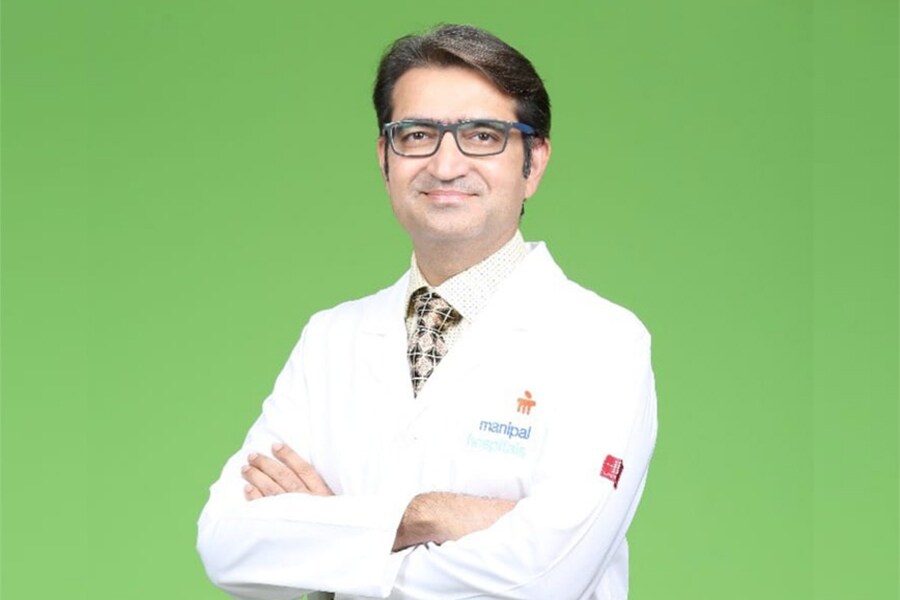
Prostate Cancer Management
By Brand Connect| Dec 7, 2021
Dr. Sanjay Garg, MBBS, MS, MCh (Urology), Consultant Urologist, Yashoda Super Speciality Hospital, Manipal Hospitals, Ghaziabad
 Prostate cancer is one of the commonest cancer in male in India.
Prostate cancer is one of the commonest cancer in male in India.
The prostate is a part of the male reproductive system that makes semen. The walnut-sized gland is located beneath the bladder and surrounds the upper part of the urethra, the tube that carries urine from the bladder.
Signs and Symptoms?
However, these symptoms can be because of many other causes than prostate cancer, such as a benign enlarged prostate. Most men with prostate cancer die of other causes, and may never know that they have the disease. But once prostate cancer begins to grow quickly or spreads outside the prostate, it is dangerous.
As men increase in age, their risk of developing prostate cancer increases. About 60% of all prostate cancers are diagnosed in men over the age of 65. There is some evidence that a diet high in animal fat may increase the risk of prostate cancer and a diet high in fruits and vegetables may decrease the risk.
Signs & symptoms of advanced Prostate may include:
- Urinary symptoms such as urinary frequency or a weak stream of urine
- Blood in the urine
- Erection problems
- Urinary incontinence
- Loss of bowel control
- Pain in the hips, back, chest, or legs
Early Detection is most vital in any cancer. Two tests are commonly used to screen for prostate cancer—
Digital Rectal Exam (DRE):
A doctor or nurse inserts a gloved, lubricated finger into the rectum to estimate the size of the prostate and feel for lumps or other abnormalities.
Prostate Specific Antigen (PSA) Test:
The doctor may order other exams, including ultrasound, MRI, or CT scans, to learn more about the cause of the symptoms. But to confirm the presence of cancer, doctors must perform a biopsy where needles are used to remove small tissue samples from the prostate and then samples are analyzed under a microscope.
Treatments
Regardless of the type of treatment received, patient will be closely monitored to see how well the treatment is working. Monitoring may include:
- A PSA blood test, usually every 3 months to 1 year
- Bone scan/ PSMA PET CT Scan/ MRI scan to see if the cancer has spread
- A complete blood count to monitor for signs and symptoms of anemia
- Looking for signs or symptoms that the disease might be progressing, such as fatigue, increased pain, or decreased bowel and bladder function.
Localized Prostate Cancer
Radiation and/or surgery are the preferred treatments for localized prostate cancer that is at risk for spread. Radiation may be administered after surgery to certain men if they are at high risk for any residual prostate cancer. Side effects from treatment of prostate cancer with surgery or radiation therapy can include urinary incontinence, erectile dysfunction, and bowel problems.
Hormone Therapy
Radiation therapy is sometimes combined with hormone therapy (also called androgen deprivation therapy or ADT). Androgens such as testosterone are hormones that can cause prostate cancer cells to grow. ADT stops testosterone from being produced or directly blocks it from acting on prostate cancer cells. Hormone therapy may be given to patients with prostate cancer that has recurred after radiation or surgery and is the standard of care for men with cancer that has spread outside the prostate to other areas of the body (metastatic disease).
Non-Metastatic Castration-Resistant Prostate Cancer
Some men who are treated with hormone therapy before they experience metastatic disease may develop a form of prostate cancer that is resistant to standard hormone therapy (known as non-metastatic castration-resistant prostate cancer). The FDA has approved three drugs for non-metastatic castration-resistant prostate cancer, including Apalutamide, Enzalutamide, and Darolutamide. These drugs block the effect of testosterone and similar hormones on the prostate cancer cells. Patients who received these drugs in clinical trials went a longer period of time without developing metastatic disease than patients who received placebo and also lived longer.
Metastatic Castration-Resistant Prostate Cancer
Yes. Today, more men are surviving prostate cancer than ever before. In fact, the number of deaths from prostate cancer has been declining since the early 1990s. if found early, the disease can very likely be cured.
The pages slugged ‘Brand Connect’ are equivalent to advertisements and are not written and produced by Forbes India journalists.